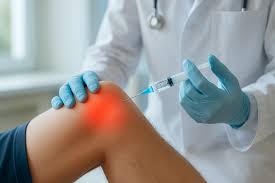Stem cell injections involve injecting undifferentiated cells into targeted parts of the body, where there’s a need for tissue regeneration. The injected cells later differentiate into cells such as nerve, muscle, and cartilage cells, aiding in the repair of damaged tissues and promoting healing. The absence of medications such as steroids in these injections makes them a natural and safe option for regenerative medicine. Here is the role of stem cell injections in regenerative medicine:
Musculoskeletal Conditions
Stem cell injections may be used as a non-surgical alternative for repairing torn tissues and healing musculoskeletal conditions, helping restore a patient’s mobility. The undifferentiated cells that help stimulate tissue regeneration and muscle healing are derived from adipose fat, amniotic fluid, and bone marrow. Some musculoskeletal conditions that these injections can treat include elbow tendonitis, joint instability, plantar fasciitis, shoulder arthritis, knee arthritis, and ankle arthritis. Here is how stem cell therapy can help manage these and other related conditions:
Cartilage Repair
When mesenchymal stem cells (MSCs) get injected into the body, they release natural growth factors and anti-inflammatory agents (cytokines). These factors stimulate the activity of the differentiated cartilage cells known as chondrocytes, which helps repair damaged parts of cartilage. Due to the action of cytokines, the injected stem cells help promote cartilage regeneration, while also reducing pain and swelling in the joints. The gradual repair and regrowth of the cartilage tissues help improve the range of motion and stability in the joints.
Tendons and Ligament Healing
Patellar tendonitis, rotator cuff tendonitis, knee ligament injuries, or elbow tendonitis can cause injury to the tendons and ligaments. Mesenchymal stem cells get injected directly into parts like ankle ligaments, patellar tendons, and rotator cuff tendons. These cells then differentiate into specialized tendon-like cells, known as tenocytes, which produce collagen, cytokines, and growth factors. Due to the presence of new collagen fibers and growth factors, the structure of tendons and ligaments regenerates, facilitating the repair and healing of these connective tissues.
Neurological Disorders
Some neurological conditions that stem cell therapy may help manage include neuropathy, Lyme neuroborreliosis, and Carpal Tunnel Syndrome (CTS). Injected stem cells differentiate into nerve cells, which could help replace the neurons lost due to neurological disorders. Differentiated nerve cells may restore neural connections and the function of the brain and spinal cord. The anti-inflammatory agents (cytokines) produced by the injected stem cells could slow the progression of neurological disorders by reducing inflammation. To promote neuroprotection, physicians can directly inject stem cells into the brain, bloodstream, cerebrospinal fluid, or spinal cord.
Visceral Organ Diseases
Stem cell therapy helps treat conditions that affect organs such as the heart, kidneys, liver, and lungs. For patients with heart problems, new cardiac-supporting cells help repair scarred heart muscle (myocardium). This helps restore normal contractility. Renal tubular and endothelial cells play a role in repairing and rebuilding damaged nephrons, aiding in the treatment of liver and kidney conditions. For pulmonary conditions such as COPD and pulmonary fibrosis, injected stem cells promote the regeneration of collagen fibers. This helps repair scarred lung tissue and restore lung elasticity.
Visit a Specialist for Stem Cell Injections
Stem cell injections are an effective form of regenerative medicine that repairs and heals damaged tissues without the need for surgery. They can help alleviate various conditions, including interstitial lung disease, tendonitis, kidney disease, and Parkinson’s. Contact a stem cell physician today to schedule a complimentary consultation.
- Zirconia Cap Price: Estimated Cost & Its Long-Term Benefits
- FREHF – The Revolutionary Future Of Human-Centered Technology!
- Adsy.Pw/Hb3 – Boost Your SEO And Drive More Traffic!
- Fitness Based Vacations By Timeshealthmage.com!
- TimesHealthMag Tips For Improving Sleep Quality – Expert Advice For Better Rest!


Leave a Reply